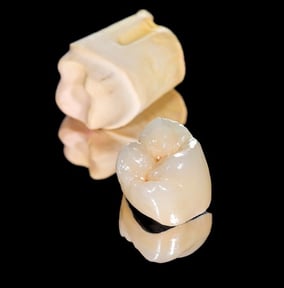A crown tooth is the ideal cosmetic dental treatment for infected, cracked, chipped, missing and broken teeth. Besides being an effective cosmetic treatment, dental crowns also benefit health by restoring the tooth structure and allowing the person to chew food properly. Also referred as cap, crowns are even used in case of a root canal or large filling.
 A dental crown is designed to complement the natural teeth of the patient with regards to size, color, texture and shape. The estimated life of a dental crown is about 10 to 12 years with proper care and dental hygiene.
A dental crown is designed to complement the natural teeth of the patient with regards to size, color, texture and shape. The estimated life of a dental crown is about 10 to 12 years with proper care and dental hygiene.
Dental Crown Types
Crowns can be classified into different categories, depending on the type of material used for fabrication. The choice of material is made by the dentist and this choice is dependent on the nature and intensity of the treatment.
- Composite Crowns
These crowns have a natural appearance. The key feature of these dental crowns is that they don’t chip easily. However, they might get worn out due to chewing. Moreover, vigorous brushing can remove the well-polished surface of the crown, thus increasing their susceptibility to getting stained more easily.
- Metal Crowns
A metal crown tooth is crafted using gold or silver. Metal crowns have a longer life compared to composite crowns. Such crowns do not have an adverse effect on the texture of the surrounding natural teeth. Gold crowns are best suited for anterior teeth (like molars), as they are not visible and hence, don’t affect your smile. As a matter of fact, these dental caps are more durable and also involve minimal tooth preparation compared to other types of dental crowns. A gold crown is best suited for patients with habits like teeth clenching or grinding. However, the color of the crown is often a deterrent.
- Porcelain Crowns
This is the most natural-looking dental crown. However, a porcelain dental crown is more fragile than composite or metal crown. The crown also is more susceptible to chipping. This is the reason that they are not used to cap anterior teeth in the mouth.
- Porcelain-fused-to metal Crowns
These dental crowns are stronger and more natural than composite or porcelain crowns. They are more durable and do not chip easily. As a result this crown tooth is quite popular with dentists as well as patients. Before the crown is fixed, there is some tooth preparation involved. The dentist has to create sufficient space around to fit the crown perfectly.
Benefits of Dental Crowns
The main reasons to get a dental crown include:
- Improved dental strength
Crowns help restore the strength of affected teeth. The crowns offer long-lasting benefits and are, therefore, considered the best way to restore the strength of affected teeth. Dental crowns are the crown of choice if the tooth requires root canal treatment. Once the cap is in place, it reinforces the tooth and prevent surrounding teeth from drifting.
- Restoration of tooth function and shape
Getting a crown is one of the best ways to restore the shape and function of a cracked or broken tooth. Crowns also help a tooth look natural and this can do wonders for a patient’s self-esteem and confidence.
- Improved tooth appearance
A crown forms the new exterior for an affected tooth. However, it is always matched in color and size to surrounding teeth. As a result, others cannot make out you have a crown.
Akin to your natural teeth, crowns also require proper care. After getting a crown, make sure you brush and floss your teeth regularly. This will prevent plaque formation and keep infections, tooth decay and gum problems at bay. Most importantly, avoid chewing on hard substances to prevent damage to the crown tooth. Also, avoid grinding your teeth or biting fingernails if you want your crown to last a long time.




